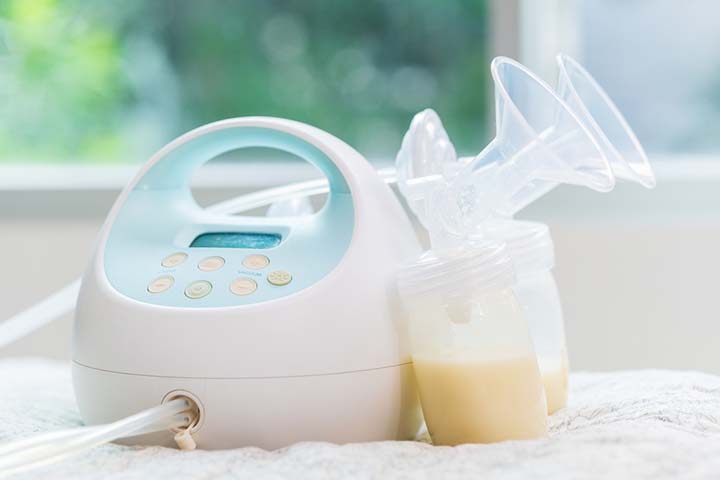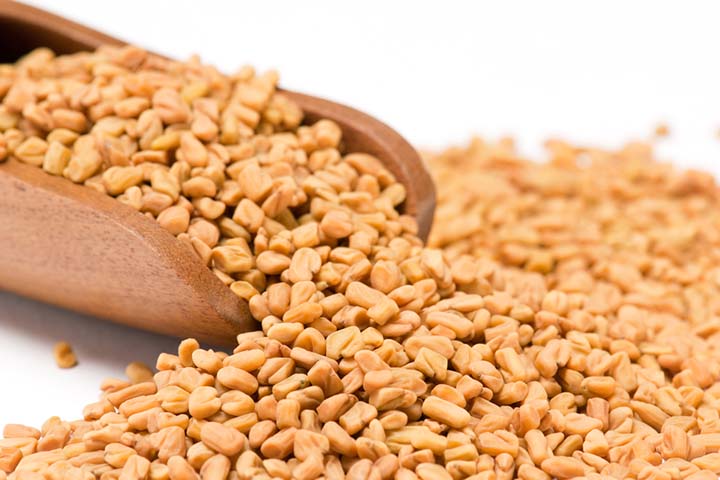Breast milk should be the only source of nourishment for a baby for the first six months. Thus, several lactating women may wonder how to increase milk supply safely.
To ensure a good milk flow, mothers should start breastfeeding at the earliest and continue frequent nursing. Good baby latching also ensures effective milk flow.
Insufficient milk production is not a common concern since new mothers usually produce sufficient milk. However, if you have been facing issues with breastfeeding, this post will help you establish a normal milk supply (1).
How To Know If Your Milk Supply Is Low?
Here are some signs that alert the mother to a low milk supply (2):
- If the baby is losing weight past the three day mark or not gaining an adequate amount of weight (per your pediatrician’s examination)
- If the baby is producing less than the expected number of wet and dirty diapers for their age (day or week after birth)
- If the baby is showing dehydration signs, such as dry mouth, dark urine, ‘brick dust’, jaundice or irritability
- If the baby is not feeding for long or less than eight times per day in the first month after birth
- If the mother is not eating enough food to sustain her supply
- If the mother is dehydrated
What Are The Causes Of Low Milk Supply?
Some possible causes that can lead to low milk supply in mothers (3):
- Oral contraceptives containing estrogen may cause bodily imbalances resulting in low milk supply.
- Smoking and alcohol intake can also affect the amount of milk supply in a mother.
- Recent mastitis (infection of breast tissue) may cause a low milk supply.
- Breast surgery can impact the creation and supply of milk.
- Scheduled breastfeeding or timed feeds leading to a lack of breast stimulation
- Inability of the baby to consume breast milk effectively.
- Baby does not feed at frequent intervals (most babies feed at least eight to 12 times daily)
- Baby is unable to latch properly to the breast.
Existing health issues, such as anemia, thyroid disorders or retained placenta, can also be the reasons for low milk supply, but they are rare.
Way To Increase Breast Milk Supply
If the mother cannot create sufficient milk for the baby, she should be encouraged to follow basic measures such as good hydration and diet, gently massaging the breast before latching the baby, limiting caffeine consumption to 200mg per day, quitting smoking and avoiding alcohol consumption. Here are some tips to help the mother increase milk supply (4):
- Pumping: This involves the use of a manual or electric breast pump or learning to hand express. The mother is advised to pump when she feels her supply is at its best – usually between midnight and 8am. She can pump from both breasts and should not expect to be able to pump as much as the baby takes from a bottle initially. Ten minutes on each breast would be a good starting point. Increased breast milk demand increases supply. Try wearing a well-fitted nursing bra to support the breasts. A tight-fitting bra may block the milk ducts or decrease milk supply, thus hindering the pumping process.
- Foods: Consuming fruits and vegetables, whole-grain products, low-fat milk, cheese, yogurt, and protein-based foods can help. A balanced diet focuses on providing high nutritional value and can improve milk supply.
Bryannah Kay, a mom of three, shares how adding sweet potatoes to her diet helped increase her breast milk supply. She says, “I’ve noticed that sweet potatoes seem to boost my milk supply. I can’t say for sure if it’s a proven thing, but I’ve developed a routine. I prepare sweet potatoes in the crockpot every Sunday, so I always have a stash of ready-to-eat sweet potatoes. I use them in various ways, like adding chicken or enjoying them with eggs for a quick, convenient meal (i).”
It is essential to note that certain foods are believed to help increase breast milk supply. However, the scientific evidence supporting the effectiveness of these foods is scarce, and their impact on breast milk supply can vary from one mother to another. Hence, consuming a well-balanced diet containing various foods is advisable.
- Herbal supplements: Also known as galactagogues, these herbs show an effective increase in milk supply in some women. According to an online survey conducted by the Journal of the Academy of Nutrition and Dietetics on 1,294 breastfeeding women in the US, it was found that about 27.7% of them reported using herbal supplements as galactogogues. The most commonly used supplement is fenugreek but there are also risks which should be taken into consideration (5). Additionally, blessed thistle and fennel are purported galactagogues but more clinical studies are required to ascertain their roles in increasing milk supply.
- Essential oils: Although there is no evidence-based research to support its use, basil essential oil may improve the overall health of the mother, which in turn, could improve her supply of milk. You should always use it with a carrier oil to dilute its strength (2).
- Medication: Healthcare professionals might prescribe certain medications, such as Domperidone, to increase the supply of milk. Make sure you discuss both the benefits and risks of any medication with your care provider.
In addition to the above-mentioned tips, the markets also sell lactation cookies containing oatmeal or oats that are believed to work as galactagogues. Medicines are often considered for their convenience by mothers, but understanding which ones to take and being aware of their potential side effects is crucial. Therefore, you should consult your lactation specialist before consuming them to know about their safety.
Medications To Increase Breast Milk Supply
Although not many, some medicines for different conditions may help increase the breast milk supply. Some of these medications include (6) (7):
- Metoclopramide: It is a gastrointestinal drug that can be used as galactagogues. A few studies state that this medication can boost breast milk production by 66 to 100% in just a few days. Nevertheless, if stopped suddenly, it comes with adverse effects and a notable decrease in breast milk production.
- Domperidone: It is a peripheral dopamine antagonist that has efficacy similar to metoclopramide and is known to increase breast milk supply.
However, the FDA has not approved these drugs for boosting breast milk production. Therefore, you must consume them only when prescribed by the healthcare provider to avoid their potential side effects. Following a comprehensive evaluation of your breast milk production and a thoughtful consideration of the benefits and risks, your doctor might recommend the ‘off-label’ use of one of these medications as a galactagogue.
Continued breastfeeding to babies up to at least six months is essential for their optimum growth and development. Hence, knowing how to increase milk supply can help mothers experiencing low breast milk supply. To improve breast milk supply, you should know the precise cause of low supply. For that, you need to consult your doctor or a lactation expert. Once the exact cause for poor or low milk supply is determined, your healthcare provider can guide you to the appropriate way to improve your breast milk supply.
Key Pointers
- Insufficient breast milk supply is not common and may occur due to intake of birth control pills, alcohol intake, breast surgery, or infections, among a few reasons.
- You may have a lack of breast milk if you notice your baby keeps losing weight, passes dark urine, and does not feed for long.
- Home remedies such as maintaining a balanced diet, massaging, using a breast pump, or taking doctor-prescribed medication may help increase the supply.















